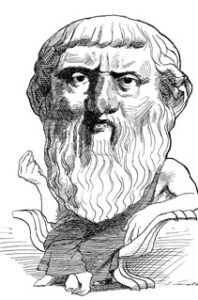Apologia Plato 041

Apología de Sócrates
Actitud de Sócrates ante la muerte
(40e-41c)
Tabla de contenidos
Ἀπολογία Σωκράτους 041
εἰ δ᾽ αὖ οἷον ἀποδημῆσαί ἐστιν ὁ θάνατος ἐνθένδε εἰς ἄλλον τόπον, καὶ ἀληθῆ ἐστιν τὰ λεγόμενα, ὡς ἄρα ἐκεῖ εἰσι πάντες οἱ τεθνεῶτες, τί μεῖζον ἀγαθὸν τούτου εἴη ἄν, ὦ ἄνδρες δικασταί; εἰ γάρ τις [41a] ἀφικόμενος εἰς Ἅιδου, ἀπαλλαγεὶς τουτωνὶ τῶν φασκόντων δικαστῶν εἶναι, εὑρήσει τοὺς ὡς ἀληθῶς δικαστάς, οἵπερ καὶ λέγονται ἐκεῖ δικάζειν, Μίνως τε καὶ Ῥαδάμανθυς καὶ Αἰακὸς καὶ Τριπτόλεμος καὶ ἄλλοι ὅσοι τῶν ἡμιθέων δίκαιοι ἐγένοντο ἐν τῷ ἑαυτῶν βίῳ, ἆρα φαύλη ἂν εἴη ἡ ἀποδημία; ἢ αὖ Ὀρφεῖ συγγενέσθαι καὶ Μουσαίῳ καὶ Ἡσιόδῳ καὶ Ὁμήρῳ ἐπὶ πόσῳ ἄν τις δέξαιτ᾽ ἂν ὑμῶν; ἐγὼ μὲν γὰρ πολλάκις ἐθέλω τεθνάναι εἰ ταῦτ᾽ ἔστιν ἀληθῆ. ἐπεὶ [41b] ἔμοιγε καὶ αὐτῷ θαυμαστὴ ἂν εἴη ἡ διατριβὴ αὐτόθι, ὁπότε ἐντύχοιμι Παλαμήδει καὶ Αἴαντι τῷ Τελαμῶνος καὶ εἴ τις ἄλλος τῶν παλαιῶν διὰ κρίσιν ἄδικον τέθνηκεν, ἀντιπαραβάλλοντι τὰ ἐμαυτοῦ πάθη πρὸς τὰ ἐκείνων—ὡς ἐγὼ οἶμαι, οὐκ ἂν ἀηδὲς εἴη—καὶ δὴ τὸ μέγιστον, τοὺς ἐκεῖ ἐξετάζοντα καὶ ἐρευνῶντα ὥσπερ τοὺς ἐνταῦθα διάγειν, τίς αὐτῶν σοφός ἐστιν καὶ τίς οἴεται μέν, ἔστιν δ᾽ οὔ.
ἐπὶ πόσῳ δ᾽ ἄν τις, ὦ ἄνδρες δικασταί, δέξαιτο ἐξετάσαι τὸν ἐπὶ Τροίαν ἀγαγόντα [41c] τὴν πολλὴν στρατιὰν ἢ Ὀδυσσέα ἢ Σίσυφον ἢ ἄλλους μυρίους ἄν τις εἴποι καὶ ἄνδρας καὶ γυναῖκας, οἷς ἐκεῖ διαλέγεσθαι καὶ συνεῖναι καὶ ἐξετάζειν ἀμήχανον ἂν εἴη εὐδαιμονίας; πάντως οὐ δήπου τούτου γε ἕνεκα οἱ ἐκεῖ ἀποκτείνουσι: τά τε γὰρ ἄλλα εὐδαιμονέστεροί εἰσιν οἱ ἐκεῖ τῶν ἐνθάδε, καὶ ἤδη τὸν λοιπὸν χρόνον ἀθάνατοί εἰσιν, εἴπερ γε τὰ λεγόμενα ἀληθῆ.
Perge ad initium paginae huius
Apologia Sōcratis 041
Pero si fuera la muerte un emigrar de aquí a otro lugar —y fuese verdad lo que se dice que Allá se encuentran todos los muertos—, ¿qué mayor bien que éste, Varones jueces? Si pues, [41a] al llegar al Hades, desembarazado ya de todos estos que se dicen jueces, se encontrase uno con los que lo son en verdad —y que se dice ser ellos los que allí juzgan: Minos y Radamanto, Eaco, Triptolemo y aquellos otros entre los semidioses que fueron justos durante su vida—, ¿hubiese sido ésta emigración sin importancia? Y ¿en cuánto no apreciara cualquiera de vosotros familiarizarse con Orfeo y Museo, con Hesíodo y Homero? Que yo, de cierto, muchas veces me quiero morir, si es verdad todo esto; [41b] porque para mí, tal como soy, fuera allí maravilloso mi género de quehacer, pues me encontrara con Palamedes y con Ayax, el hijo de Telamón, y con aquellos otros de los antiguos que murieron por juicio injusto, comparando mis padecimientos con los de ellos, lo que, tal creo, no fuera desagradable. Pero, de cierto, lo grande fuera pasar la vida poniendo a prueba a los de Allá y escudriñando, como a los de acá, quién de ellos es sabio, y quién se lo piensa ser, mas no lo es.
En cuánto tendría uno de vosotros, Varones jueces, poner a prueba por sí mismo al que condujo a Troya aquel tan grande ejército, [41c] o a Ulises o a Sísifo o a tantos miles de varones y mujeres que se pudiera nombrar, dialogar con los cuales, familiarizarse y ponerlos a prueba fuera sin duda descomunal bienaventuranza. ¡Que por esto no matan los de Allá! Y en lo demás también son más bienaventurados los de Allá que los de acá; y, si es verdad lo que se dice, serán ya, para el resto del tiempo, inmortales.
Perge ad initium paginae huius
Apology of Socrates 041
But on the other hand, if death is, as it were, a change of habitation from here to some other place, and if what we are told is true, that all the dead are there, what greater blessing could there be, judges? For if a man when he reaches the other world, [41a] after leaving behind these who claim to be judges, shall find those who are really judges who are said to sit in judgment there, Minos and Rhadamanthus, and Aeacus and Triptolemus, and all the other demigods who were just men in their lives, would the change of habitation be undesirable? Or again, what would any of you give to meet with Orpheus and Musaeus and Hesiod and Homer? I am willing to die many times over, if these things are true; for I personally should find the life there wonderful, [41b] when I met Palamedes or Ajax, the son of Telamon, or any other men of old who lost their lives through an unjust judgement, and compared my experience with theirs. I think that would not be unpleasant. And the greatest pleasure would be to pass my time in examining and investigating the people there, as I do those here, to find out who among them is wise and who thinks he is when he is not.
What price would any of you pay, judges, to examine him who led the great army against Troy, [41c] or Odysseus, or Sisyphus, or countless others, both men and women, whom I might mention? To converse and associate with them and examine them would be immeasurable happiness. At any rate, the folk there do not kill people for it; since, if what we are told is true, they are immortal for all future time, besides being happier in other respects than men are here.
Perge ad initium paginae huius
Conversaciones en el Ātrium Philosophicum
EN CONSTRVCCION

EN CONSTRVCCION
Perge ad initium paginae huius
OFFICĪNA PHILOSOPHŌRVM ***
